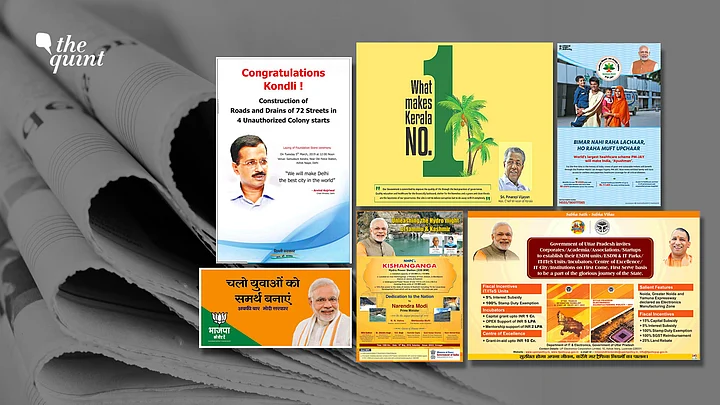Central and state governments widely use advertisements in the print media to promote their schemes, policies, and leaders. These 'sarkari' ads - full page ads, half page ads - routinely seen in leading dailies, are paid for by the public exchequer - better known as "taxpayers' money".
Since it is public money that funds such advertisements, the government is duty bound under the Constitution to lay down a fair procedure for selecting media for advertisements. Discriminatory or arbitrary selection of media, or paying different rates, would violate the right to equality under Article 14 of the Constitution.
The Print Media Advertisement Policy (2020), newly released by the Union Ministry for Information & Broadcasting, lays down the rules that the government must follow in sanctioning advertisements. The primary objective of the policy is to secure the widest possible coverage of the intended content or message of the government.
The new advertisement policy provides clear procedures for empanelment of newspapers and periodicals, release of advertisements, advertisement rates, payment of bills and penalties. Every government advertisement needs to be routed through the Bureau of Communications (BOC). The BOC has replaced the Directorate of Advertising and Visual Publicity (DAVP), which used to be the nodal agency for government ads.
Empanelment of Media Publications
Media organisations need to first apply for empanelment if they wish to be considered for carrying government advertisements. Applications are considered by a 6-member Panel Advisory Committee that recommends names of media outlets to the BOC.
The media is classified into three groups:
Small Publication: Publications with circulation up to 25,000 copies per publishing day
Medium Publication: Publications with circulation between 25,001 and 75,000 copies per publishing day.
Big Publication: Publications with circulation of above 75,000 copies per publishing day
In order to be eligible for empanelment, the publication must have been uninterruptedly and regularly under publication for a period of not less than 36 months. This requirement is reduced to 12 months for small and medium newspapers of all regional languages.
As per the answer given by the I&B Minister before the Lok Sabha on July 26, 2021, a total of 1,44,740 newspapers and periodicals are registered with the Registrar of Newspapers in India. Of these, only 7394 publications are empanelled with the BOC for dissemination of government ads.
Advertisement Rates
The advertisement rates are issued by the BOC on the recommendation of the Rate Structure Committee. The rates are related to the certified circulation of a publication. Each empanelled media publication needs to provide certified proof of their circulation figures.
All empanelled publications enter into a rate contract with the BOC based on the rate offered and other terms and conditions, to ensure the proper and timely publication of BOC advertisements. The circulation certificate issued by the BOC is valid for 2 years.
All publications empanelled with the BOC have to ensure regular publication. The BOC also pledges to avoid releasing ads which incite or tend to incite communal passion, preach violence, offend the sovereignty of India or socially accepted norms of public decency.
Most crucially, the BOC is mandated not to take into account the political affiliation or editorial policies of newspapers/ periodicals while releasing advertisements to publications.
Suspension, Disqualification and Penalties
A media publication can be suspended from carrying government advertisements by BOC for a period of 12 months:
If the publication is found to have deliberately submitted false information regarding circulation or otherwise.
If the publication discontinues its publication, changes its periodicity or its title or becomes irregular in publication or changes its address of publication without intimation
If the publication fails to submit its Annual Return or its Circulation Verification Certificate from prescribed agencies to the BOC
If the publication refuses to accept and carry an ad issued by the BOC on behalf of the Government on more than three occasions.
Also, if the circulation figures are found to be fabricated or exaggerated, the extra amount paid to the publisher will be recovered, and the publication will be suspended till the amount is recovered
And finally, if the Publisher/Owner/Chief Editor is convicted for any criminal offence or conduct, penal action against the publication will be as per the recommendation of the Press Council of India.
The new policy has also given the power to the BOC to penalise by suspension any publication on the ground of "violating norms of journalistic conduct" or "indulging in any anti-national activity". It is the Press Council of India which has been empowered to decide whether a publication has violated these grounds or not.
